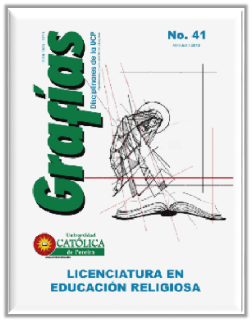Learning as knowledge construction
DOI:
https://doi.org/10.31908/grafias.v0i41.1179Keywords:
Learning, building, interaction, teaching model, contextAbstract
The current reflection tackles the question of how the student of the LER builds knowledge, conceiving knowledge as a systemic transmission of knowledge, this being something inconclusive, in which the limits are not drawn. During the discussion the Philosophy is approached, that has given account of this search throughout the history of the man, later some aspects from the psychology are approached especially focusing in the learning. Psychology with the perspective of constructivist learning provides new elements to understand the importance of the relationship of the context and of others. And finally pedagogy, from the teaching-learning model becomes an essential aspect to understand, the role of the student and the teacher in dialogical interaction, in which language is the mediating instrument, giving rise to the construction of new knowledge.
References
Ausubel, D. y Novak, J. (1953). Psicologíaeducativa. México: Trillas.Bonner, J. (1982). La evolución de la culturade los animales. Madrid: Alianza.
Cochram-Smith, M. (2003). Teaching qualitymatters. Journal of Teacher Education,54(2), 95-98.
De Zubiría Samper, M. (2006) Psicología deltalento y la creatividad: Bogotá. FundaciónInternacional de Pedagogía ConceptualAlberto Merani.
Fávero, M. (2005). Psicologia econhecimento. Subsídios da psicología do.desenvolvimento para a análise de ensinar eaprender. Brasília: Universidade de Brasília.
García, E. (2006). Las competencias delprofesor en la sociedad del conocimiento.En: R. Mejía (Coord.). Educación,Globalización y Desarrollo Humano. SantoDomingo, RD: Editora Buho
López, A. y Del Barrio, M. (eds) (2009).Las plataformas de aprendizaje. Del mito ala realidad. Madrid: Biblioteca Nueva.
Peaget, J. (1977). Psicología de lainteligencia. Buenos Aires. Psique.
Peaget, J. (1985). La toma de conciencia.Madrid. Ediciones Morata S. A
Piaget, J. (1986). Seis estudios de psicología.(2ª ed.) Barcelona: Barral.
Reale, G. (2011). Historia de la filosofía; 1filosofía pagana antigua. México. EditorialSan Pablo.
Ribes-Iñesta, E. (2007). Lenguaje,aprendizaje y conocimiento. RevistaMexicana de Psicología, 24. Disponibleen: http://www.redalyc.org/articulo.oa?id=243020635002 ISSN 0185-6073
Rotterdam, E. (2008). Elogio a la locura.Barcelona: Editorial JG
UCP (2003). Documento PropuestaPedagógica institucional. Pereira: Autor.
Woolfolk, A. (2006). Psicología Educativa.México: Pearson.


